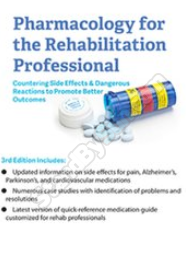Chad C. Hensel - Pharmacology for the Rehabilitation Professional

PRINCIPLES OF PHARMACOLOGY
- Pharmacokinetic principles
- Pharmacodynamics principles
- Their importance to rehabilitation
PHARMACOLOGY OF THE CENTRAL NERVOUS SYSTEM
- Common CNS drugs seen in rehabilitation
- Side effects and rehabilitation outcomes
PATIENT ORIENTED PROBLEM SOLVING (POPS) CASE STUDY
PAIN MANAGEMENT - NARCOTICS, NONSTERIODAL, ANTI-INFLAMMATORY DRUGS
- Advantages and disadvantages of each class
- Common side effects and their effect on rehabilitation outcomes
- Signs and symptoms of abuse
CARDIAC MEDICATIONS
- 5 classes of cardiac medications
- How these drugs are combined to treat cardiac disease/pathology
- Therapeutic effects and side effects that may interfere with rehabilitation outcomes
POPS CASE STUDIES
Would you like to receive Chad C. Hensel - Pharmacology for the Rehabilitation Professional ?
Description:
Many patients being referred to therapy are taking prescription and/or over-the-counter medications. Although many of these medications are directly related to their therapy diagnosis, some may not be. What should you know about clinical pharmacology to manage them effectively?
Watch leading rehab pharmacology expert, Dr. Suzanne Tinsley, as she examines the critical aspects of pharmacology, including the principles of pharmacodynamics and pharmacokinetics as well as how to apply these concepts to all drug classifications. You will hear specific concepts of the pharmacology of the central nervous system and autonomic nervous system.
You will analyze effects of drug actions on the major body systems, including mechanisms of therapeutic actions and adverse drug effects, problems involving drug interactions, and variables that modify drugs’ effects. Special consideration will be given to many of the drugs most commonly used in treating cardiovascular and neuro-musculoskeletal disorders. Using case reports, you will uncover specific effects that have an impact on the rehabilitation management of patients and clients.